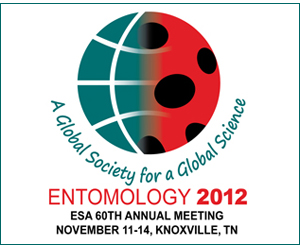North Central Branch Annual Meeting Online Program
Evaluation of reproductive stage soybeans for resistance to the soybean aphid, Aphis glycines Matsumura (Hemiptera: Aphididae)
Monday, June 4, 2012: 10:03 AM
Regents D (Embassy Suites)
The soybean aphid, Aphis glycines Matsumura, was introduced into the U.S. in 2000 and is a significant risk to soybean production throughout the north central U.S. soybean growing region. A possible solution to this problem is the use of host plant resistance. In this study, we evaluated four soybean genotypes KS4202, K1621, K1639-2, and Asgrow 2703 for resistance to A. glycines in field studies during 2007 and 2009. No significant differences in the six yield parameters were observed between aphid-infested plots and non-infested plots for the genotypes evaluated for the 2007-growing season. Unlike, the 2007 season, the economic injury level (EIL) was reached in all genotypes during the 2009-growing season. Most of the genotypes showed no significant differences in yield or yield parameters with some minor exceptions for a few yield parameters. For KS4202, the average seed weight and the average number of seeds per pod for aphid infested treatments were significantly lower than their respective non-infested control plants. The mean number of aphids was significantly higher for KS4202 when compared to the other genotypes and the average peak number of aphids for this genotype was almost 5 times the economic threshold. The results from 2007 and 2009 indicate that KS4202 can support aphid populations without significant yield loss at levels where significant yield loss would be expected.


